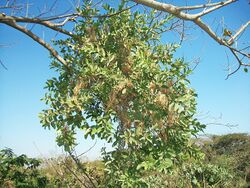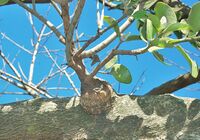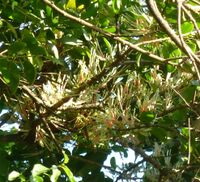Biology:Erianthemum dregei
| Hairy mistletoe | |
|---|---|

| |
| E. dregei on a Croton sylvaticus host at Amanzimtoti, South Africa | |
| Scientific classification | |
| Kingdom: | Plantae |
| Clade: | Tracheophytes |
| Clade: | Angiosperms |
| Clade: | Eudicots |
| Order: | Santalales |
| Family: | Loranthaceae |
| Genus: | Erianthemum |
| Species: | E. dregei
|
| Binomial name | |
| Erianthemum dregei (Eckl. & Zeyh.) Tiegh.
| |
| Synonyms | |
| |
Erianthemum dregei is a species of parasitic plant in the family Loranthaceae, and is commonly known as the hairy mistletoe or wood flower.[1]
Distribution and habitat
These plants are native to Africa and are parasitic on a large number of tree species in higher rainfall areas[2] from the Eastern Cape of South Africa , through KwaZulu-Natal, Eswatini and Mpumalanga,[1] to East Africa, as far as northern Ethiopia.[3] They are also found in southern Angola.[3]
Description
A branched parasitic shrub with spreading or pendent stems,[2][3] forming clumps of up to 2m x 1.5m.[1] The leaves are leathery and hairless, usually alternate (sometimes opposite[2]), with conspicuous side veins.[1] The growing points are velvety brown.[1] The flowers are massed in small clusters and are densely hairy,[1] pale yellowish-green and sometimes flushed orange to pink.[2] The fruit is an orange to bright red berry, 10–15 mm in size.[3] Erianthemum dregei shows great variation across its range.[3]
Human uses
Erianthemum dregei is used in African traditional medicine to treat stomach complaints in children and cattle.[1]
Ecological significance
The flowers and fruit attract birds.[1] The leaves are eaten by the larvae of Mylothris agathina.[4]
References
- ↑ 1.0 1.1 1.2 1.3 1.4 1.5 1.6 1.7 E. Pooley (1998). A Field Guide to Wild Flowers of KwaZulu-Natal and the Eastern Region. Natal Flora Publications Trust. ISBN 978-0-620-21500-8.
- ↑ 2.0 2.1 2.2 2.3 Hyde, M.A., Wursten, B.T. & Ballings, P. (2011). Flora of Zimbabwe: Species information: Erianthemum dregei. http://www.zimbabweflora.co.zw/speciesdata/species.php?species_id=120950, retrieved 28 November 2011.
- ↑ 3.0 3.1 3.2 3.3 3.4 JSTOR PLANT SCIENCE: Entry for ERIANTHEMUM dregei (Eckl. & Zeyh.) Tiegh.:http://plants.jstor.org/flora/ftea004152, retrieved 28 November 2011.
- ↑ Woodhall, Steve (2005). Field Guide to Butterflies of South Africa. Cape Town, South Africa: Struik. ISBN 978-1-86872-724-7.
External links
Wikidata ☰ Q5385925 entry
 |



